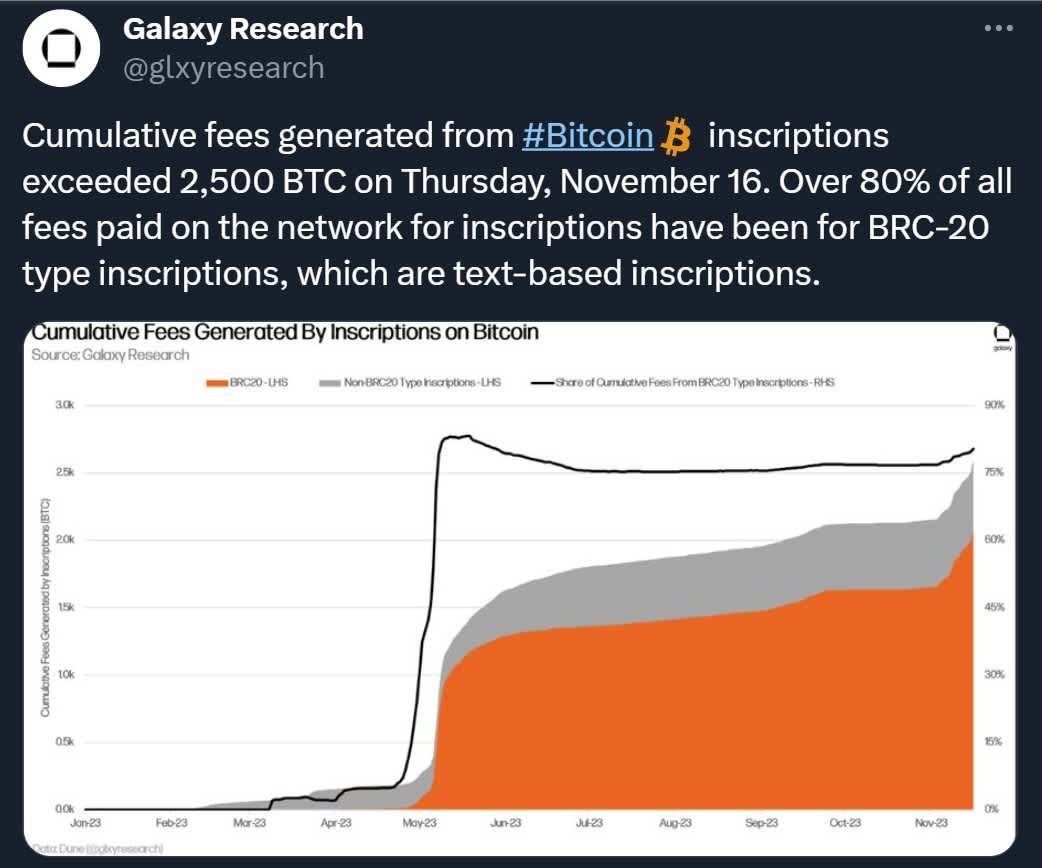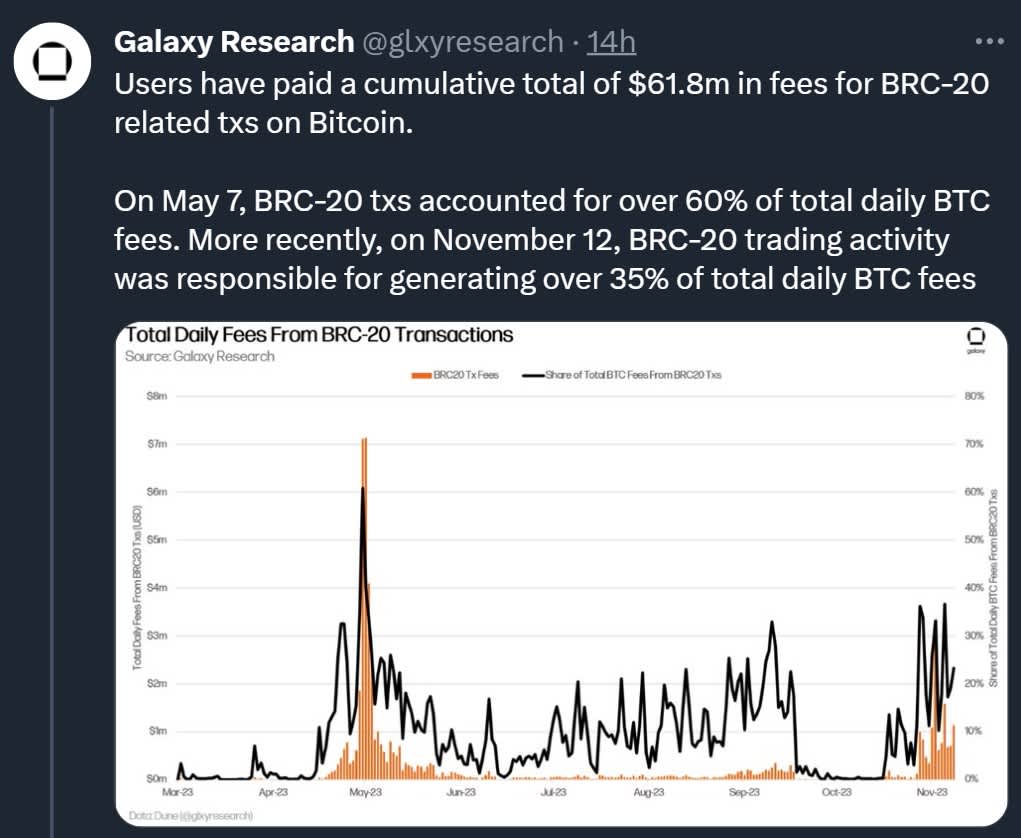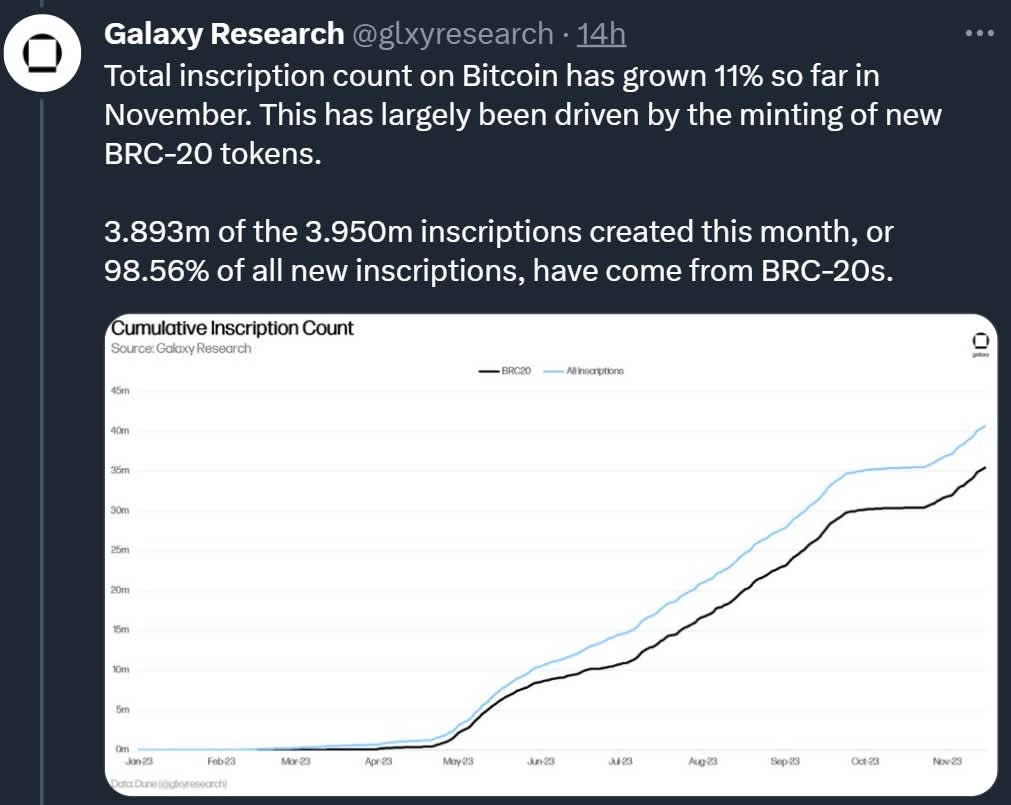Top Stories of the Week - 11/17

This week in the newsletter, we write about increased activity on Solana, JPM & Apollo’s announcement of doing finance onchain, and new updates in the ETF game.
Subscribe here and receive Galaxy's Weekly Top Stories, and more, directly to your inbox.
TradFi collaborates with Crypto for new tokenization initiatives
JPMorgan and Apollo Global pilot tokenized portfolio management solution in collaboration with crypto projects. As part of the Project Guardian initiative by Singapore's central bank ('MAS') to explore the feasibility of DeFi and tokenization applications, Onyx by JPMorgan and Apollo revealed a Proof of Concept (PoC) for how asset managers could tokenize funds for managing discretionary portfolios. According to Tyrone Lobbal, the head of Onyx Digital Assets, the goal of the new project is to "create solutions that bring significant efficiencies and enable better outcomes for asset and wealth managers and investors through personalized, highly scalable portfolios, regardless of asset class or where those assets are managed and recorded."
The PoC for the blockchain-based wealth solution showed JPMorgan and Apollo leveraging several crypto-native projects to enable trade execution and rebalancing for automated portfolio management of tokenized funds across multiple chains. Specifically, fund managers (JPMorgan Private Bank, Apollo, & WisdomTree) leveraged Onyx and Oasis Pro for tokenization of funds, Avalanche and Provenance for their permissioned blockchain solutions, and Axelar and LayerZero for interoperability across chains.
Four other tokenization pilot programs were announced this week at Singapore's Fintech Festival as part of the MAS' Project Guardian including: (i) Citi, T Rowe Price and Fidelity using blockchain to price and execute bilateral trades and real-time post-trade reporting, (ii) BNY Mellon and OCBC Bank working on a cross-border FX payment product across different chains, (iii) Ant Group testing out a treasury management solution with real-time multi-currency clearing and settlement, and (iv) Franklin Templeton looking to issue a tokenized money market fund through a variable capital company structure (VCC) to provide flexibility in the issuance & redemption of shares.
OUR TAKE:
TradFi is warming up to crypto as the industry aims to modernize their financial infrastructure and product offerings. The collaboration between JPMorgan and Apollo on the new wealth management tokenization project was likely driven by JPMorgan's former Head of Digital Assets Strategy, Christine Moy, who left the bank to join Apollo in April 2022. As more talent migrates between TradFi and crypto, we expect to see further collaborations to help bring institutions and enterprises on-chain.
Most of these new tokenization project announcements coming out of Singapore's Fintech Festival build on existing blockchain-based initiatives by the well-recognized TradFi brands - Onyx Digital Assets has already settled $950bn in tokenized treasuries since its launch[AT1] , Apollo has showcased the origination and ownership transfer of digital mortgages on-chain, and Franklin Templeton and WisdomTree have issued tokenized money market funds on public blockchains.
However, what stands out with this week's new Project Guardian announcements is that they utilize public blockchain infrastructure and permissioned solutions by crypto-native firms (including Avalanche, LayerZero, and Axelar) rather than fully-permissioned environments such as Consensys' Quorum or R3's Corda. This suggests: (i) TradFi may be looking to collaborate, rather than directly challenge, crypto incumbents with new tokenization initiatives, and (ii) institutional- and enterprise-grade blockchain solutions are nearing production-readiness to meet the stringent compliance requirements of TradFi. To promote crypto innovation in the US, regulators and policymakers should take note of Singapore's productive and supportive digital asset policies for both financial institutions and crypto incumbents to experiment and operate. – Charles Yu
Solana Onchain Activity Picks Up Following Price Rally and Breakpoint
Solana's DEX volumes hit a record $3.2 billion this month, surpassing the previous $2.8 billion peak in November 2022, as reported by DefiLlama. A surge in onchain activity over the past week saw transactions per second (TPS) consistently exceed 600, an increase from its usual 400 range. The uptick in activity comes just two weeks after Solana’s annual Breakpoint Conference and following a series of major network updates rolled out over the past year.
Since its mainnet beta launch in March 2021, Solana has experienced 18 days of downtime or degraded performance, accounting for 2% of its total uptime. This remains a significant criticism of the network. In response, Solana Labs, the primary development team for the Solana protocol, rolled out a series of upgrades over the past year to improve network performance and uptime.
Despite negative sentiment surrounding Solana post-FTX, the ecosystem has witnessed significant growth this year. Highlights include partnerships with Visa and Shopify, the onboarding of major DePIN protocols from other chains, and the introduction of innovative technologies like state compression. Additionally, Solana’s annual Hyperdrive Hackathon attracted over 900 teams and more than 7,000 participants.
A key announcement at Solana’s Breakpoint conference was the testnet launch of Firedancer, a new validator client developed by Jump Crypto. Firedancer will boost network performance and resilience and is expected to launch on mainnet in the second half of 2024. Reflecting growing interest, Solana’s native token, SOL, is up 500% this year.
OUR TAKE:
There's a noticeable shift in the crypto ecosystem’s perception of Solana. Solana has a determined group of young founders/developers necessary to accelerate adoption of the chain over the coming years. There is also a growing social layer, thanks to the large number of NFT communities established during the 2021 cycle that stuck around. This strong developer and community ecosystem, coupled with major protocol updates over the past year, have earned Solana a reputation as the “third chain,” as it is one of the most frequently mentioned chains after Bitcoin and Ethereum.
The recent surge in onchain activity appears to be a validation of the effectiveness of network updates like QUIC, Stake-weighted Quality of Service, and Local Fee Markets. Onchain liquidity remains a major obstacle to Solana’s further growth and there is a growing consensus amongst ecosystem teams that Solana needs more application tokens. Over the next six months multiple teams in the DeFi and NFT space have planned airdrops. Onchain liquidity will also benefit from integrations with newly launched exchanges Backpack and Cube which have plans to improve accessibility to Solana ecosystem tokens.
Solana faces stiff competition from the Ethereum layer 2 landscape as well as alt layer 1s. However, Solana remains one of few layer 1s with a meaningfully differentiated technology and the community and products to back it up. Once a chain condemned to obsolescence due to frequent downtime and the collapse of FTX, Solana is now not only a viable solution, but one of the best options, for payments, DePIN, and a growing set of consumer products. This should continue to be a strong tailwind for adoption and growth of the network. -Lucas Tcheyan
BlackRock Files for Spot ETH ETF
On Wednesday, BlackRock, the world’s largest asset manager, filed for a spot ether (ETH) exchange-traded fund (ETF) with the U.S. Securities and Exchange Commission (SEC). The official S-1 registration statement follows from an earlier filing submitted by BlackRock last Thursday, November 9, with the Delaware Department of State Division of Corporations that registered the ETF as an entity called the iShares Ethereum Trust. BlackRock currently awaits approval from the SEC for a spot bitcoin (BTC) ETF, dubbed the iShares Bitcoin Trust, which was filed with the SEC back in June.
There are currently 12 spot BTC ETF applications and six spot ETH ETF applications under review by the SEC. On Wednesday, the SEC delayed a final decision on Hashdex’s application to convert its existing BTC futures ETF into a spot vehicle. The delay provides the SEC another 45 days to reach a decision, meaning the next deadline for the Hashdex spot BTC ETF application is January 1, 2024. The SEC also delayed ruling on Grayscale’s proposed Ethereum ETF on Wednesday, pushing the deadline to next year.
The next immediate deadlines for a decision by the SEC are for the Franklin Templeton and Global X spot BTC ETF applications, due November 17 and 21 respectively. Anticipation for the approval of a Bitcoin spot ETF has been mounting ever since Grayscale won their suit against the SEC for the SEC’s denial of Grayscale’s application to convert GBTC to a spot ETF. Since the ruling was released by the US DC Circuit Court of Appeals in August, the odds of a spot BTC ETF approval has increased dramatically. Bloomberg analysts predict 90% odds for an approval by January 10, 2024.
Heightened anticipation has also led to increased speculation on the price of BTC, ETH, and other crypto assets in recent weeks. An erroneous report in October that BlackRock’s spot BTC ETF application was approved by the SEC caused BTC price to rise 10% within 15 minutes. On Monday, November 13, fake news of a spot XRP ETF filing by BlackRock caused XRP price to spike 12% within 30 minutes. At time of writing, ETH price hovers just below $2,000, showing no noticeable price increase since news of BlackRock’s spot ETH ETF application on Wednesday.
Our Take:
Reading the tea leaves as to when an approval of a spot BTC ETF will occur is becoming increasingly intricate as the various deadlines for all 12 applications get closer and in some cases are reached. The SEC’s decision this Wednesday to delay a final decision on the Hashdex spot BTC ETF application does not reduce odds of an eventual approval of all spot BTC ETF applications that have been re-filed over the last few weeks by the January 10 deadline, which is the final deadline for a decision from the SEC on the ARK 21Shares Bitcoin ETF.
As stated in our report sizing the market for a Bitcoin ETF, an approval for a US-regulated spot BTC ETF product will be a significant catalyst for the adoption of Bitcoin and crypto as an asset class. Because of this, the markets have become increasingly reactive to any piece of news, two of which have been fake, related to crypto spot ETF applications. The longer the SEC waits to approve a spot BTC ETF product, the higher the odds of a sustained period of heightened speculation, volatility, and sensitivity from market participants on the price of BTC and other major crypto assets in lead up to the approval.
BlackRock’s decision to file a spot ETH ETF application before an approval from the SEC on their spot BTC ETF application indicates a high level of confidence in the treatment of ETH as a commodity by regulators in the U.S. The SEC has never publicly commented on whether ETH should be classified as a security, but, as Bloomberg Intelligence ETF Analyst James Seyffart points out, doing so would likely lead to “a duel” with the Commodity Futures Trading Commission (CFTC) as numerous CFTC chairs and representatives have unequivocally asserted ETH’s classification as a commodity. Couple this with the fact that the SEC themselves have already approved nine futures ETH ETF products and the DC Court of Appeal’s rejection of the argument that a bitcoin spot ETF should receive different treatment from a bitcoin futures ETF by regulators. All these facts suggest that the likelihood of an approval for a spot ETH ETF not long after a spot BTC ETF approval is high. - Christine Kim/Lucas Tcheyan
Charts of the Week



Other News
Bitcoin Ordinals startup Taproot Wizards raises $7.5 million in seed round
BlackRock files for spot Ethereum ETF with SEC
Circle Ventures invests in Sei to expand USDC ecosystem
OKX launches new ZK Layer 2 network 'X1' with Polygon CDK
Disney and Dapper Labs launch Star Wars, Pixar 'digital pin' platform
Former Polygon Labs president Ryan Wyatt joins Optimism as Chief Growth Officer
Vitalik says plasma is the endgame for EVM validiums
Maker's Spark protocol hit $1bn in total value locked (TVL) within six months of its launch
Microsoft, Tencent and other tech giants join Decentralized Infura Network
Legal Disclosure:
This document, and the information contained herein, has been provided to you by Galaxy Digital Holdings LP and its affiliates (“Galaxy Digital”) solely for informational purposes. This document may not be reproduced or redistributed in whole or in part, in any format, without the express written approval of Galaxy Digital. Neither the information, nor any opinion contained in this document, constitutes an offer to buy or sell, or a solicitation of an offer to buy or sell, any advisory services, securities, futures, options or other financial instruments or to participate in any advisory services or trading strategy. Nothing contained in this document constitutes investment, legal or tax advice or is an endorsementof any of the digital assets or companies mentioned herein. You should make your own investigations and evaluations of the information herein. Any decisions based on information contained in this document are the sole responsibility of the reader. Certain statements in this document reflect Galaxy Digital’s views, estimates, opinions or predictions (which may be based on proprietary models and assumptions, including, in particular, Galaxy Digital’s views on the current and future market for certain digital assets), and there is no guarantee that these views, estimates, opinions or predictions are currently accurate or that they will be ultimately realized. To the extent these assumptions or models are not correct or circumstances change, the actual performance may vary substantially from, and be less than, the estimates included herein. None of Galaxy Digital nor any of its affiliates, shareholders, partners, members, directors, officers, management, employees or representatives makes any representation or warranty, express or implied, as to the accuracy or completeness of any of the information or any other information (whether communicated in written or oral form) transmitted or made available to you. Each of the aforementioned parties expressly disclaims any and all liability relating to or resulting from the use of this information. Certain information contained herein (including financial information) has been obtained from published and non-published sources. Such information has not been independently verified by Galaxy Digital and, Galaxy Digital, does not assume responsibility for the accuracy of such information. Affiliates of Galaxy Digital may have owned or may own investments in some of the digital assets and protocols discussed in this document. Except where otherwise indicated, the information in this document is based on matters as they exist as of the date of preparation and not as of any future date, and will not be updated or otherwise revised to reflect information that subsequently becomes available, or circumstances existing or changes occurring after the date hereof. This document provides links to other Websites that we think might be of interest to you. Please note that when you click on one of these links, you may be moving to a provider’s website that is not associated with Galaxy Digital. These linked sites and their providers are not controlled by us, and we are not responsible for the contents or the proper operation of any linked site. The inclusion of any link does not imply our endorsement or our adoption of the statements therein. We encourage you to read the terms of use and privacy statements of these linked sites as their policies may differ from ours. The foregoing does not constitute a “research report” as defined by FINRA Rule 2241 or a “debt research report” as defined by FINRA Rule 2242 and was not prepared by Galaxy Digital Partners LLC. For all inquiries, please email [email protected]. ©Copyright Galaxy Digital Holdings LP 2023. All rights reserved.




